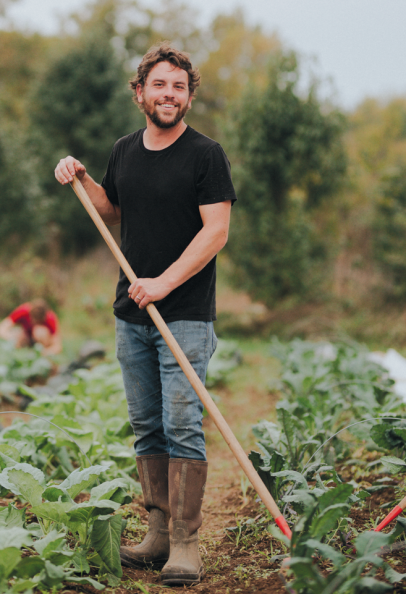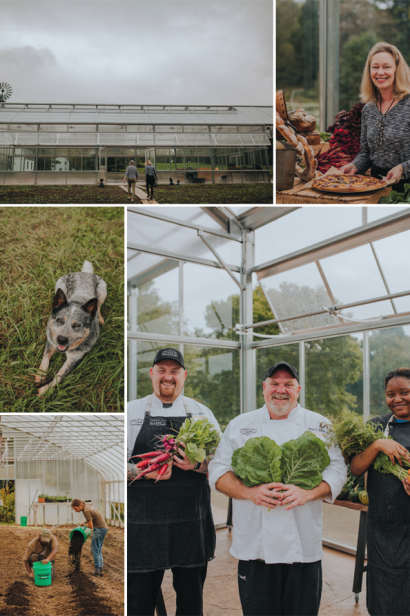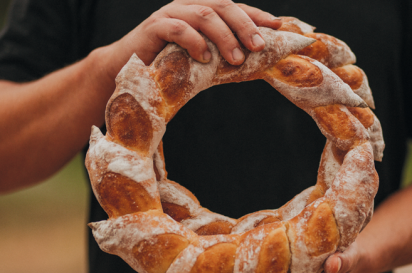Theology Meets Ecology
Bread baking is an art, a skill and an avocation, and after 30 years of success in New York City’s competitive food culture, master baker Sarah Black has come home at last to bake at Seminary Hill Farm (SHF) in Delaware, Ohio.
Now working just 27 miles from her hometown of Marion, Sarah admits to feeling like Dorothy Gale in the film based on The Wizard of Oz, discovering that, all along, happiness had been hiding “in my own backyard.”
The winding road to SHF began years ago when Sarah read Wendell Berry’s essays about sustainable agriculture and stewardship. “It seared my soul,” she says, but not until she was back in Ohio in 2015 as baking director at new-concept bakery Flowers and Bread in Columbus did she look further.
Sarah embraced her job, taught bread classes, released a cookbook. Still, she yearned for more.
In March 2018, Sarah discovered Seminary Hill Farm, on the greencampus of Methodist Theological School of Ohio (MTSO), through farm manager Noel Deehr’s (#smileyfarmgirl) Instagram feed.
Nothing if not determined, Sarah wangled an invitation to visit the farm and meet Tadd Petersen, the 35-year-old director of MTSO’s Farm and Food Department, which includes catering and dining as well as the farm.
A Unique Opportunity
Despite growing up in Indiana on a “family homestead,” Tadd rejected farming and used his philosophy degree from Liberty University in Virginia to secure a job as a process engineer for a plastics plant. “For five years. I wore a hairnet, eye protection, the whole shebang. One day I was standing at my extruder wondering ‘What the heck am I doing here?’”
He quit his job and took a nine-month organic farming course at Michigan State University. In 2013, Tadd was a married father of three. He was teaching farming skills to returning citizens for Job and Family Services in Toledo when MTSO President Jay Rundell and Kathy Dickson of Community Food and Wellness recruited him.
“My wife and I saw problems with the food system a decade ago,” Tadd says, “and we had a vision of growing food for our family and homesteading.” But he saw a “unique opportunity” with SHF. “The farm is one way that MTSO can positively impact food-system inequities.”
SHF received its organic certification in 2014. That September, Tadd contacted Noel, a fellow student at Michigan State.
Noel saw the same promise that Tadd had seen. “Two weeks later,” she says, “I was here. Tadd and I are a good team. He’s the mastermind, I’m detail-oriented.”
Farm and Mission
Part of SHF’s raison d’etre is to connect MTSO’s 150 graduate students plus faculty with locally grown good food by serving it in the dining hall. SHF produces about 20% of that food, with the rest coming from local farmers. That includes 100% of the protein, which is pasture-based and non-GMO. Even the cheese is local.
Executive Chef James Akers, formerly executive chef at Ohio Wesleyan University, wants to “show people it’s possible to provide local food right here in Delaware every day.” He is laying plans for cooking classes and community-oriented events, like the upcoming Little Winter Tours, that involve local businesses.
Chef de Cuisine Brian Murphy, a Culinary Institute of America graduate, says “At SHF we can do what the French are so good at— food that is seasonal and local and utilizes every possible part of the meat or vegetable.”
The culinary team (including 20-year-old Daejah McCormick) cooks 140 student/faculty lunches every Tuesday through Thursday, and handles all on-campus events that require food, whether for 60 or 600.
Growing Bigger by Growing Smaller
In 2017, SHF grew 46,000 pounds of produce on 10 intensively cultivated acres. In 2018, the number of community-supported agriculture (CSA) harvest subscription members rose to 300.
In 2019, the plan is to double production—using only 3.5 acres.
Tadd is confident that this will work, counterintuitive as it seems. “We are using a biodiverse, intensive, market-style farming,” he says.
“We use smaller spaces and maximize production,” using labor-intensive techniques like transplanting seedlings by hand and seeding with a precision seeder.
It’s complicated. Spreadsheets exhaustively detail each crop variety— that’s 90 varieties of 30 different vegetables—and when to seed, transplant and harvest.
The staff of nine, including two apprentice farmers, is ever alert to increasing production. For example, farm foreman Taylor Green, 28, “keeps everyone moving,” while experimenting with companion plantings like mushrooms in an asparagus field.
SHF also provides eggs from its 180 free-range hens, guarded by three vigilant geese with puffy, Elvis-like topknots. If a hawk invades, the geese honk wildly in warning.
SHF sells at farmers markets in New Albany and Linden—Linden, Tadd says “because it is a food insecure neighborhood [meaning it lacks access to enough good, nutritious, affordable food], and there was a campus-wide initiative to live out what we’re trying to do in terms of food justice.”
CSA Innovations
CSA harvest subscriptions are the backbone of farm production. Customers buy seasonal shares, then pick them up weekly at either German Village or the farm. Meat shares are also available from local farmers through SHF.
Instead of a standard, no-choice “mystery box,” customers choose what they want from Noel’s enticing produce displays, paying for it in CSA credits. Farm staff greet them by name, answer questions and chat.
Laura Elliot of Marysville says that her pediatrician recommended a CSA to encourage her children, Katie, 10, and Max, 9, to eat vegetables.
“I bring the kids right off the school bus,” she says. “They pick out the vegetables. They had never eaten peppers before. It’s been great!”
The bread CSB (community-supported breads) is Sarah’s idea, beginning with holiday baking, then continuing through the winter months. “We are hoping to have bread pickup every Saturday,” Sarah says, “and eventually include winter vegetables, soups and sandwiches.”
“I thought it was a great idea,” Tadd says. “People enjoy that value added product, and we are using local heritage grains.” (See below, “Baking Biodiversity.”)
Sarah bakes 100 loaves per week—100 beautiful loaves of a quality seldom seen in local bakeries. Whole Wheat Rye and Honey loaves and Milk Bread are standards, and any occasion may inspire a tasty newcomer.
Living the Mission
MTSO strives to live out the motto that appears on their website and T-shirts around campus: Theology. Ecology. Good Food for All. SHF is part of an effort that includes ecotheology classes and a Community Food and Wellness Initiative. And they are making progress.
“We are poised to have a significant impact on the food system in Central Ohio,” Tadd says.
SHF is working with Franklinton Farms in Columbus and with The Ohio State University InFACT (Initiative for Food and AgriCultural Transformation) program to address the problem of food deserts in the city. First, SHF surveyed area farmers and the Franklinton neighborhood to determine the needs of both.
“We want to create a multi-farm model that would help support areas that don’t have access or have limited access to good food,” Tadd says. “SHF and MTSO could become an aggregator and distributor to bring good food to those in need.”
The Shape of Things to Come
The long-awaited, recently completed, 3,000-square-foot greenhouse with patio seems a portent of good things to come at Seminary Hill. On the horizon: a walking garden of native and edible plants, an indoor/outdoor kitchen with wood-fired oven and a second, adjoining greenhouse whose soil floor will extend the growing season. The large greenhouse will become an event space when it is not sheltering transplants.
Every staff member brims with ideas for the farm. Café. Forestry project. Winter bread CSA. Worm composting. Baking school. Orchard. All done in service to Earth and community.
Sarah is delighted to be a part of the large and inspiring whole that is Seminary Hill Farm. “I feel that I am at the very top of my game, baking the best breads that I’ve ever made.” She smiles her engaging smile. “The farm is where I want to be because the land, this place, connects me to what is authentic.”
For further information:
Methodist Theological School of Ohio: www.mtso.edu
Seminary Hill Farm events, classes, and CSA and CSB: www.mtso.edu/ecotheology/seminary-hill-farm/
Follow Sarah on Instagram #sarahsbreads
Purchase Sarah’s breads at Olivina Taproom, 44 High St. in Delaware, www.olivinataproom.com
Baking Biodiversity: Heritage and Ancient Grains
In 1903 commercial American seed houses offered 307 varieties of corn. Today there are fewer than 10. By some estimates, the U.S. has lost 90% of its fruit and vegetable varieties in the last 100 years.
This dependence on monoculture—planting only a few strains of a single crop—means that a new pest or virus could virtually wipe out an entire plant species. But SHF practices biodiversity, growing a wide variety of crops, including heritage (non-hybridized) varieties, to reduce crop loss due to pests and diseases, benefit soil function and protect food traditions.
For the same reasons, SHF baker Sarah Black chooses heritage, organic, non-GMO grains, grown on Stutzman Farms in Millersburg. One is Turkey Red, a hard winter wheat that originated in Turkey prior to the 1800s and was brought to Kansas in the early 1870s by Mennonite immigrants from Russia. In the 1920s, it was the predominant hard winter wheat strain grown in the U.S. Turkey Red flour gives Sarah the best flavor and texture profile for her signature whole-wheat breads.
“I’m in love with it,” Sarah says. “It’s a pleasure to shape and proof.” And she notes that it scores well, resulting in beautiful and dramatic crust designs.
Spelt, a 9,000-year-old, highly nutritious, sort-of cousin to wheat, also appears in Sarah’s kitchen. Today, Ohio grows most of the nation’s spelt (10 times more than any other state), making it a natural for the farm. Sarah showcases its nutty goodness in delicious sweet and savory focaccias.






